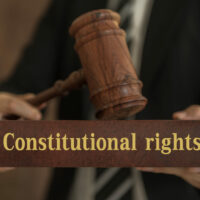Top Ten Constitutional Rights in a Criminal Case

Generally, the Constitution outlines the federal government’s powers. The Bill of Rights limits federal power, specifically with regard to police power. Over the years, the Supreme Court has applied most of these limits to state governments as well.
Police officers do not always respect individual rights. So, it’s important for people to know what their rights are. It’s even more important for a Port St. Lucie criminal lawyer to stand up for these rights in court. Otherwise, prosecutors might run roughshod over individual liberties.
Grand Jury in Felony Cases
This is one of the only provisions in the Bill of Rights which only applies to the federal government. Before government prosecutors indict defendants for serious crimes, a grand jury must determine that there is probable cause to believe the defendant is guilty. Many people try to “talk their way” out of an indictment. That’s almost always impossible, so you should never face a grand jury without a lawyer.
No Double Jeopardy
People cannot be tried twice for substantially the same crime. For example, if a defendant is acquitted of drug trafficking charges, prosecutors cannot file drug possession charges. These offenses are substantially similar. In other words, prosecutors cannot keep charging people with crimes until they get the result they want.
Right to Remain Silent
This right is probably the most important one in criminal investigations. Defendants need not answer questions. Additionally, defendants need not submit to tests, like posing for a picture, providing fingerprints, performing field sobriety tests, or appearing in a live lineup.
Due Process
At a minimum, due process includes notice and hearing. In the criminal law context, that means knowing the exact nature of the charges against them. Police officers are not required to furnish this information at the time of arrest. The exact nature of the charges often affects an attorney’s defense strategy. Furthermore, the hearing must be a trial based on the facts. At this trial, the defendant is presumed innocent until proven guilty beyond a reasonable doubt.
Limited Search and Seizure
In colonial days, British officials used blank search warrants to search private property whenever it suited them. So, the Constitution requires authorities to have search warrants which are based on probable cause. In the absence of a warrant, searches must fall under one of several recognized exceptions, such as a consent search or a plain view seizure.
Public Trial
Do not overlook this important right. In most cases, the defendant’s trial must be public. Judges and prosecutors are often on their best behavior when they know the public is watching. Additionally, a public trial makes it easier to identify errors and present them to an appellate court. All proceedings are transcribed or otherwise recorded.
Discovery
Prosecutors might hate this right more than any other one. Frequently, they rely on trial by ambush. They withhold evidence until the last minute, so an attorney cannot prepare a proper defense. The Constitution’s discovery requirement levels the playing field. On a related note, defendants have the right to retain investigators and collect their own evidence.
Confrontation
In most cases, the accusing witness or witnesses must appear in public and be subject to cross-examination. An experienced attorney knows how to chip away at a witnesses’ credibility and thus create reasonable doubt. Sometimes, judges authorize exceptions to this requirement, mostly in child sexual abuse cases.
Right to Counsel
The Sixth Amendment does not just guarantee the right to a lawyer. It guarantees the right to a competent lawyer. Additionally, that attorney can be present during the pretrial phase as well.
The Punishment Must Fit the Crime
This right often comes up with regard to forfeiture laws. For example, the state might compel the defendant to give up his car because a small quantity of drugs was found inside the car. Such proceedings are clearly illegal. On a related note, the state cannot freeze the defendant’s financial assets if such action restricts the defendant’s ability to hire a lawyer.
Connect with an Assertive Lawyer
Defendants have important rights in criminal cases. For a free consultation with an experienced criminal defense attorney in Port St. Lucie, contact Eighmie Law Firm, P.A. We routinely handle matters throughout the Treasure Coast area.
https://www.eighmielawfirm.com/getting-around-the-graves-amendment/


